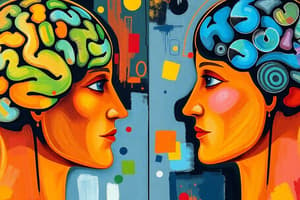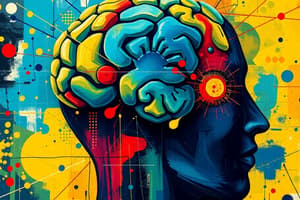Podcast
Questions and Answers
ما هي الفائدة الرئيسية من استخدام التكنولوجيا والأدوات الرقمية في الرعاية الصحية؟
ما هي الفائدة الرئيسية من استخدام التكنولوجيا والأدوات الرقمية في الرعاية الصحية؟
- تقليل الأخطاء في تقديم الخدمات (correct)
- تسريع عملية شفاء المرضى
- تسهيل الوصول إلى الأدوية
- زيادة عدد الأطباء المتاحين
أي مما يلي يعتبر تحديًا قانونيًا لممارسي العلاج النفسي؟
أي مما يلي يعتبر تحديًا قانونيًا لممارسي العلاج النفسي؟
- اتباع القواعد والتشريعات (correct)
- التقليل من وقت الجلسات
- تقديم المشورة للأفراد فقط
- استخدام التكنولوجيا في العلاج
كيف يمكن أن تؤثر التكنولوجيا على كفاءة تقديم الخدمات الصحية؟
كيف يمكن أن تؤثر التكنولوجيا على كفاءة تقديم الخدمات الصحية؟
- عن طريق زيادة تكاليف العلاج
- من خلال تحسين التواصل بين الأطباء والمرضى (correct)
- بتقليل عدد المستشفيات المتاحة
- بزيادة مدة الانتظار للحصول على الخدمة
ما هي إحدى النتائج السلبية المحتملة لعدم اتباع التشريعات من قبل ممارسي الصحة النفسية؟
ما هي إحدى النتائج السلبية المحتملة لعدم اتباع التشريعات من قبل ممارسي الصحة النفسية؟
ما الهدف من استخدام الأدوات الرقمية في مجال الصحة النفسية؟
ما الهدف من استخدام الأدوات الرقمية في مجال الصحة النفسية؟
ما هي إحدى النتائج السلبية للضغوط الناتجة عن الجدول الزمنى في تقديم الرعاية الصحية؟
ما هي إحدى النتائج السلبية للضغوط الناتجة عن الجدول الزمنى في تقديم الرعاية الصحية؟
ما هي الصعوبات التي تواجه ممارسي العلاج النفسي وفقاً للمحتوى؟
ما هي الصعوبات التي تواجه ممارسي العلاج النفسي وفقاً للمحتوى؟
كيف تؤثر الضغوط الناتجة عن الجدول الزمنى على جودة الرعاية المقدمة للمرضى؟
كيف تؤثر الضغوط الناتجة عن الجدول الزمنى على جودة الرعاية المقدمة للمرضى؟
ما هو التأثير المحتمل لعدم القدرة على تلبية احتياجات المرضى؟
ما هو التأثير المحتمل لعدم القدرة على تلبية احتياجات المرضى؟
ما هي إحدى العوامل التي تضع ضغطاً على مقدمي الرعاية الصحية؟
ما هي إحدى العوامل التي تضع ضغطاً على مقدمي الرعاية الصحية؟
ما المقصود بالتحديات التي تواجه تطوير التكنولوجيا في سياق الروبوتات؟
ما المقصود بالتحديات التي تواجه تطوير التكنولوجيا في سياق الروبوتات؟
أي من الخيارات التالية يمثل مثالاً على القيم الأخلاقية التي يجب أن تطور عليها الروبوتات؟
أي من الخيارات التالية يمثل مثالاً على القيم الأخلاقية التي يجب أن تطور عليها الروبوتات؟
ما هو الهدف من تطوير الروبوتات على أساس القيم الأخلاقية؟
ما هو الهدف من تطوير الروبوتات على أساس القيم الأخلاقية؟
ماذا يعني أن الروبوت قد يرفض طلباً؟
ماذا يعني أن الروبوت قد يرفض طلباً؟
ما هي إحدى النتائج المحتملة لسوء فهم القيم الأخلاقية في تطوير الروبوتات؟
ما هي إحدى النتائج المحتملة لسوء فهم القيم الأخلاقية في تطوير الروبوتات؟
ماهي المدة الزمنية التي قد يخرج فيها الذكاء الاصطناعي عن السيطرة حسب بعض العلماء؟
ماهي المدة الزمنية التي قد يخرج فيها الذكاء الاصطناعي عن السيطرة حسب بعض العلماء؟
ما هو الحل المقترح لمشكلة خروج الذكاء الاصطناعي عن السيطرة؟
ما هو الحل المقترح لمشكلة خروج الذكاء الاصطناعي عن السيطرة؟
ما هو الغرض من إعادة التخطيط حسب النقاش حول الذكاء الاصطناعي؟
ما هو الغرض من إعادة التخطيط حسب النقاش حول الذكاء الاصطناعي؟
ما الذي تشير إليه عبارة
ما الذي تشير إليه عبارة
أي من العبارات التالية تعكس قلق بعض العلماء حول الذكاء الاصطناعي؟
أي من العبارات التالية تعكس قلق بعض العلماء حول الذكاء الاصطناعي؟
كيف يمكن أن يؤثر الذكاء الاصطناعي على الصراعات المستقبلية في المجتمعات؟
كيف يمكن أن يؤثر الذكاء الاصطناعي على الصراعات المستقبلية في المجتمعات؟
ما هو أحد العوامل التي قد تسهم في تنفيذ الذكاء الاصطناعي في الحروب؟
ما هو أحد العوامل التي قد تسهم في تنفيذ الذكاء الاصطناعي في الحروب؟
ما هو الجانب الأخلاقي المفقود عند استخدام الذكاء الاصطناعي في الحروب؟
ما هو الجانب الأخلاقي المفقود عند استخدام الذكاء الاصطناعي في الحروب؟
ما التحديات المحتملة التي قد تنتج عن الاعتماد على الذكاء الاصطناعي في الحروب؟
ما التحديات المحتملة التي قد تنتج عن الاعتماد على الذكاء الاصطناعي في الحروب؟
ما هو الدور المحتمل للذكاء الاصطناعي في التوترات السياسية؟
ما هو الدور المحتمل للذكاء الاصطناعي في التوترات السياسية؟
كيف ستساهم الروبوتات في تحسين التفاعلات الاجتماعية بحلول عام 2030؟
كيف ستساهم الروبوتات في تحسين التفاعلات الاجتماعية بحلول عام 2030؟
ما هو الدور المتوقع للروبوتات في الحياة اليومية بحلول عام 2030؟
ما هو الدور المتوقع للروبوتات في الحياة اليومية بحلول عام 2030؟
كيف ستحتاج الروبوتات إلى التفاعل مع البشر ليصبحوا فعّالين في المواقف الاجتماعية؟
كيف ستحتاج الروبوتات إلى التفاعل مع البشر ليصبحوا فعّالين في المواقف الاجتماعية؟
ما هي إحدى الوسائل التي ستتحقق بها التفاعلات الاجتماعية عبر الروبوتات بحلول 2030؟
ما هي إحدى الوسائل التي ستتحقق بها التفاعلات الاجتماعية عبر الروبوتات بحلول 2030؟
ما هو التغيير المتوقع في حياة الناس بسبب تفاعلهم مع الروبوتات؟
ما هو التغيير المتوقع في حياة الناس بسبب تفاعلهم مع الروبوتات؟
Flashcards
Time Pressure
Time Pressure
Stress resulting from a schedule and inability to meet patient needs, impacting care quality.
Patient Needs
Patient Needs
Requirements of a patient that must be met for proper care.
Care Quality
Care Quality
Level of excellence in the provided care to a patient.
Technical Difficulties
Technical Difficulties
Signup and view all the flashcards
Mental Health Professionals
Mental Health Professionals
Signup and view all the flashcards
Digital tools in healthcare
Digital tools in healthcare
Signup and view all the flashcards
Legal guidelines
Legal guidelines
Signup and view all the flashcards
Error reduction
Error reduction
Signup and view all the flashcards
Service efficiency
Service efficiency
Signup and view all the flashcards
Mental health professionals
Mental health professionals
Signup and view all the flashcards
Robotic Values
Robotic Values
Signup and view all the flashcards
Robotic Decision-Making
Robotic Decision-Making
Signup and view all the flashcards
Technological Development Challenges
Technological Development Challenges
Signup and view all the flashcards
Interpretation (robots)
Interpretation (robots)
Signup and view all the flashcards
Refusal request
Refusal request
Signup and view all the flashcards
2030 Social Interactions
2030 Social Interactions
Signup and view all the flashcards
AI taking over
AI taking over
Signup and view all the flashcards
Robot Interaction
Robot Interaction
Signup and view all the flashcards
Economic response needed
Economic response needed
Signup and view all the flashcards
Rethinking necessary
Rethinking necessary
Signup and view all the flashcards
Home Interactions
Home Interactions
Signup and view all the flashcards
Social Ease
Social Ease
Signup and view all the flashcards
Expert concern
Expert concern
Signup and view all the flashcards
Robot Communication
Robot Communication
Signup and view all the flashcards
Human control needed
Human control needed
Signup and view all the flashcards
AI in War
AI in War
Signup and view all the flashcards
AI & Morality
AI & Morality
Signup and view all the flashcards
Unresolved Conflicts
Unresolved Conflicts
Signup and view all the flashcards
AI War Concerns
AI War Concerns
Signup and view all the flashcards
AI Enters Warfare
AI Enters Warfare
Signup and view all the flashcards
Study Notes
Psychology of Human Intelligence and its Relation to Artificial Intelligence
- Psychology: The study of human traits and behavior.
- Human Intelligence: God-given cognitive abilities related to thinking, understanding, and learning.
- Artificial Intelligence: Human-created systems designed to mimic human cognitive abilities through information processing (e.g., computers).
Factors Affecting Human Intelligence
- Genetic Factors: Vary from person to person.
- Environmental Factors: Influence intelligence positively or negatively (e.g., parent-child relationship).
- Educational Factors: Learning enhances intelligence (e.g., reading).
Artificial Intelligence Techniques
- Machine Learning: A technique to achieve AI through information input to computers.
- Deep Learning: A subset of machine learning using specific data (neural networks).
- Neural Networks: Computer networks resembling the human nervous system. These applications are found in medicine and commerce.
Psychology of Human Sensory Perception and its Relation to Artificial Intelligence
- Human Perception: A cognitive process of understanding the external world through sensory stimuli, leading to decisions and influencing behavior (e.g., throwing an object).
- Artificial Perception: Scientists' technique to enable computers to think like humans (as seen in chess and educational programs supporting successful student outcomes).
Psychology of Human Creativity and its Relation to Artificial Intelligence
- Creativity: Individual's capacity to generate novel and applicable ideas (e.g., developing a new advertisement).
- Factors Influencing Creativity:
- Knowledge and Experience: Increased exposure to life situations improves learning and experience.
- Mental Flexibility: Thinking beyond conventional ways.
- Social Influences: Open societies encouraging innovative problem-solving inspire creativity.
- Artificial Creativity: AI-powered tools assisting authors and video creators in generating content without scripts.
Psychology of Human Problem-Solving and its Relation to Artificial Intelligence
- Factors Influencing Problem-Solving:
- Knowledge and Experience: Useful for problem-solving.
- Positive Emotions: Help in problem-solving (e.g., reducing anxiety when faced with a problem).
- Self-Confidence and Perseverance: Essential for overcoming challenges.
- Strengthening Problem-Solving Abilities:
- Critical Thinking: Analyzing situations logically to differentiate truth from misinformation (e.g., verifying news).
- Mental Flexibility and Creative Thinking: Enhance problem-solving skills.
- AI in Problem-Solving: AI handles data and ambiguities effectively (e.g., applications separating sounds, aiding in homicide cases).
Psychology of Human Thinking and its Relation to Artificial Intelligence
- Thinking: A cognitive process in the human mind utilizing long-term memory to store information for extended periods (e.g., recalling a childhood friend's name).
- Human Thinking vs. AI Thinking: Human thought relies on cognitive processes with experience and emotions, while AI uses processes and data, relying on machine learning, deep learning, and neural networks.
Psychology of Human Attention and its Relation to Artificial Intelligence
- Attention: Focusing on crucial information while disregarding irrelevant details (e.g., summarizing).
- Importance of Attention: Vital for social interactions (e.g., actively listening to a friend).
- Negative Effects on Attention:
- Distractions (e.g., noise in a classroom).
- Mental Fatigue (e.g., many classes without breaks).
- Improving Attention:
- Meditation and Relaxation:
- Adequate Sleep:
- Physical Activity (e.g., Yoga):
Artificial Intelligence: Applications and Evaluation
-
AI Development: Scientists aim to create machines discerning crucial data (e.g., translation, self-driving cars).
-
AI limitations: Despite advancements, human attention remains unique.
-
AI evaluation: Ethical AI, validated by testing and evaluation criteria.
-
Testing and Validation:
-
Turing Test: Hypothetical game comparing human conversation with a computer to distinguish between them.
-
Expert and Non-Expert Testing: Evaluating AI ethics using expert and public opinions.
-
Criteria: Ethical AI, professional standards (e.g., Australian computing society code of ethics, ACM update). Company criteria include data privacy.
Challenges and Future Perspectives of Artificial Intelligence
- Principle Challenges: Variation in ethical principles across organizations.
- Ethical Challenges: Virtue ethics, consequences, duties, and coordination across diverse cultures.
- Technological Challenges:
- Explanation (e.g., why an AI rejected a loan application)
- Fairness (treating people equally)
- Privacy and Security (protecting user data)
- Sustainability and Robustness (system resilience)
Challenges in AI-Related Psychology
- Subjective Values: Varying ethical views across individuals/organizations.
- Philosophical Concerns: Difficulties in consistent ethical judgments across cultures.
- Technological Limitations: The process of explaining decisions, the presence of bias, and potential data privacy and security concerns.
- Sustainability and Resilience: System ability to function through varying conditions and situations.
- Solutions: Aligning values and developing ethical AI frameworks, which meet community and ethical standards.
Future of AI and Humanity
- Changing Life: AI-related changes in daily routines, work, transportation, and interactions are anticipated.
- 2030 Predictions: Integration of AI in everyday life, advancements in technology, and cooperation between humans and machines.
- Surveys (2018): Experts predict increased human efficiency, but raise concerns about AI dominance.
- Concerns about Job Displacement: Possibility of job loss due to AI automation and efficiency
Human Freedom of Choice in the AI Age
- Impact of AI on Free Will: Potential decrease in human control over self-determination as routine decisions are delegated to AI.
- Technological Advancement:
- Smart Homes: AI controls home functions like lights, climate, and security systems.
- Personalized Assistants: Personalized assistance with tasks and planning.
- Self-Driving Cars: Autonomous transportation, reducing congestion and improving safety.
- AI-Enhanced Work: Increased efficiency and speed in tasks and decision-making.
Ethical Considerations in AI Development
- AI Ethics: Establishing ethical standards in creating AI systems, integrating human values.
- Methodology and Evaluation: Developing consistent and effective methodologies for evaluating AI ethics.
- Human-AI Relationships: Ensuring the ongoing value of human-to-human interaction and preventing AI from becoming dominant.
- Data Handling: Protecting and safeguarding human data in AI systems.
Concerns Related to Human Wellbeing and Future
- Mental Health Challenges: Stress from technological advancements and societal shifts.
- Financial Concerns: Educational costs hindering educational accessibility.
Studying That Suits You
Use AI to generate personalized quizzes and flashcards to suit your learning preferences.




